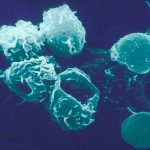Link to Pubmed [PMID] – 22210913
J. Immunol. 2012 Feb;188(3):1245-54
RANK and its ligand RANKL play important roles in the development and regulation of the immune system. We show that mice transgenic for Rank in hair follicles display massive postnatal growth of skin-draining lymph nodes. The proportions of hematopoietic and nonhematopoietic stromal cells and their organization are maintained, with the exception of an increase in B cell follicles. The hematopoietic cells are not activated and respond to immunization by foreign Ag and adjuvant. We demonstrate that soluble RANKL is overproduced from the transgenic hair follicles and that its neutralization normalizes lymph node size, inclusive area, and numbers of B cell follicles. Reticular fibroblastic and vascular stromal cells, important for secondary lymphoid organ formation and organization, express RANK and undergo hyperproliferation, which is abrogated by RANKL neutralization. In addition, they express higher levels of CXCL13 and CCL19 chemokines, as well as MAdCAM-1 and VCAM-1 cell-adhesion molecules. These findings highlight the importance of tissue-derived cues for secondary lymphoid organ homeostasis and identify RANKL as a key molecule for controlling the plasticity of the immune system.


